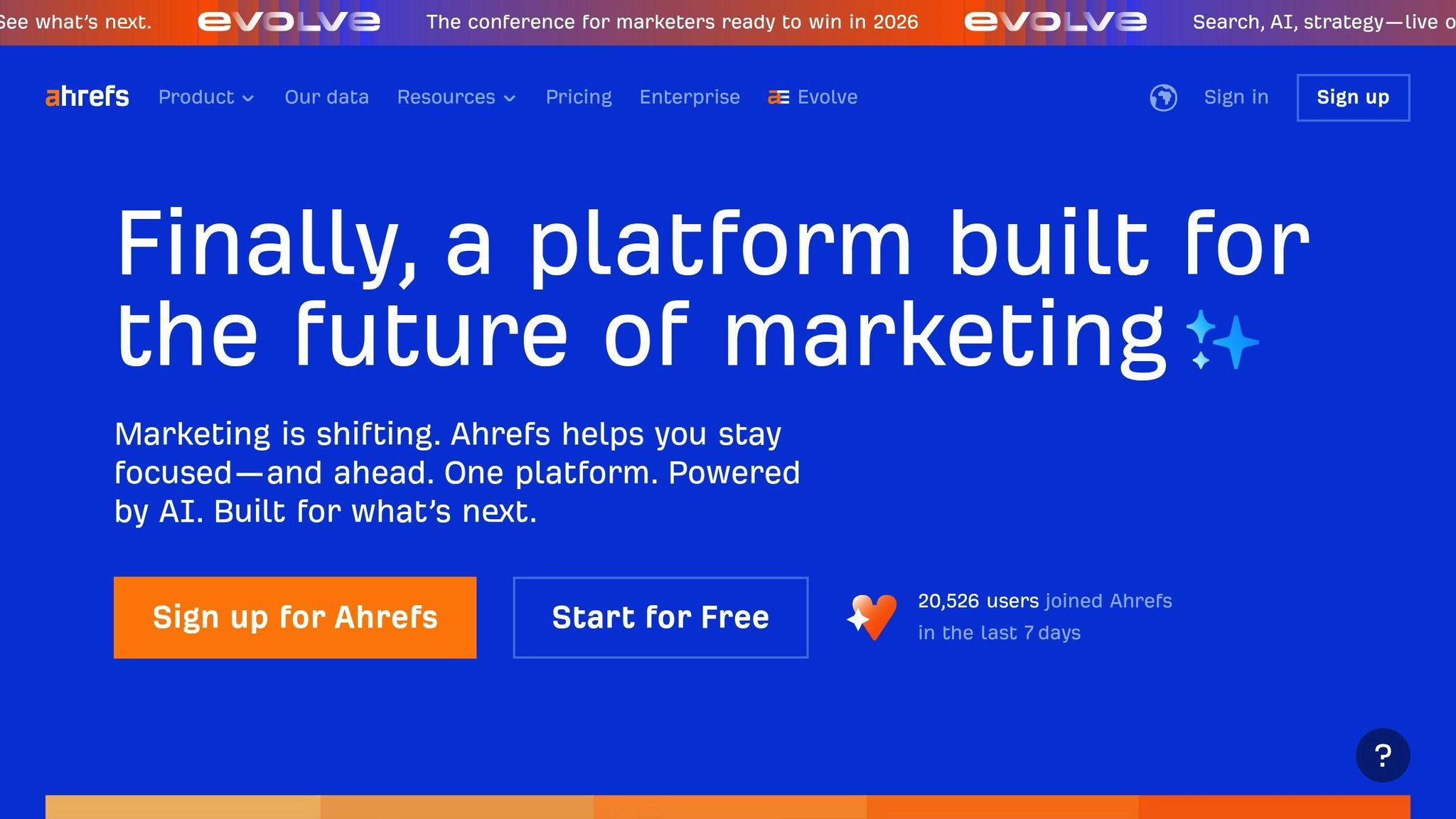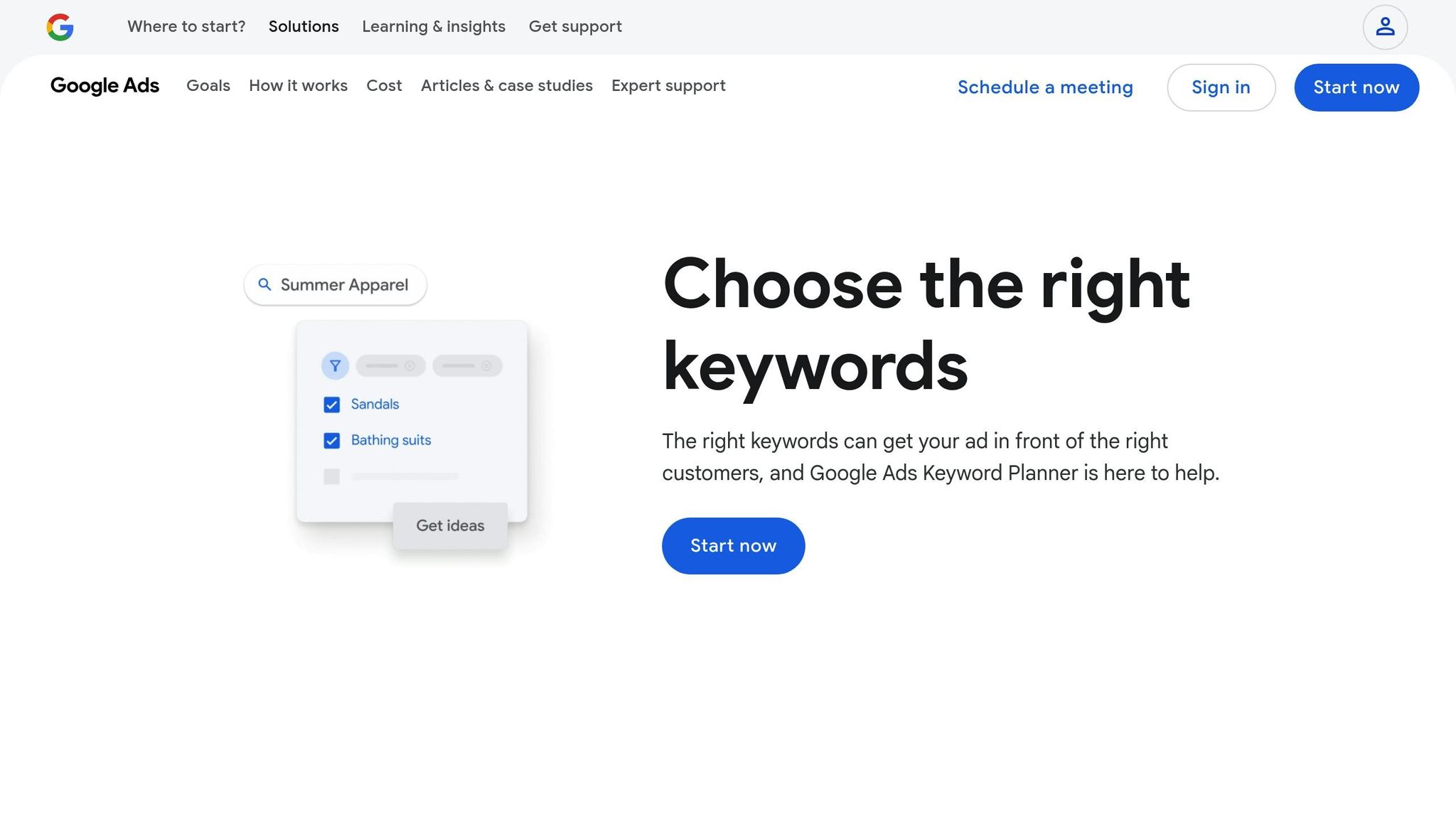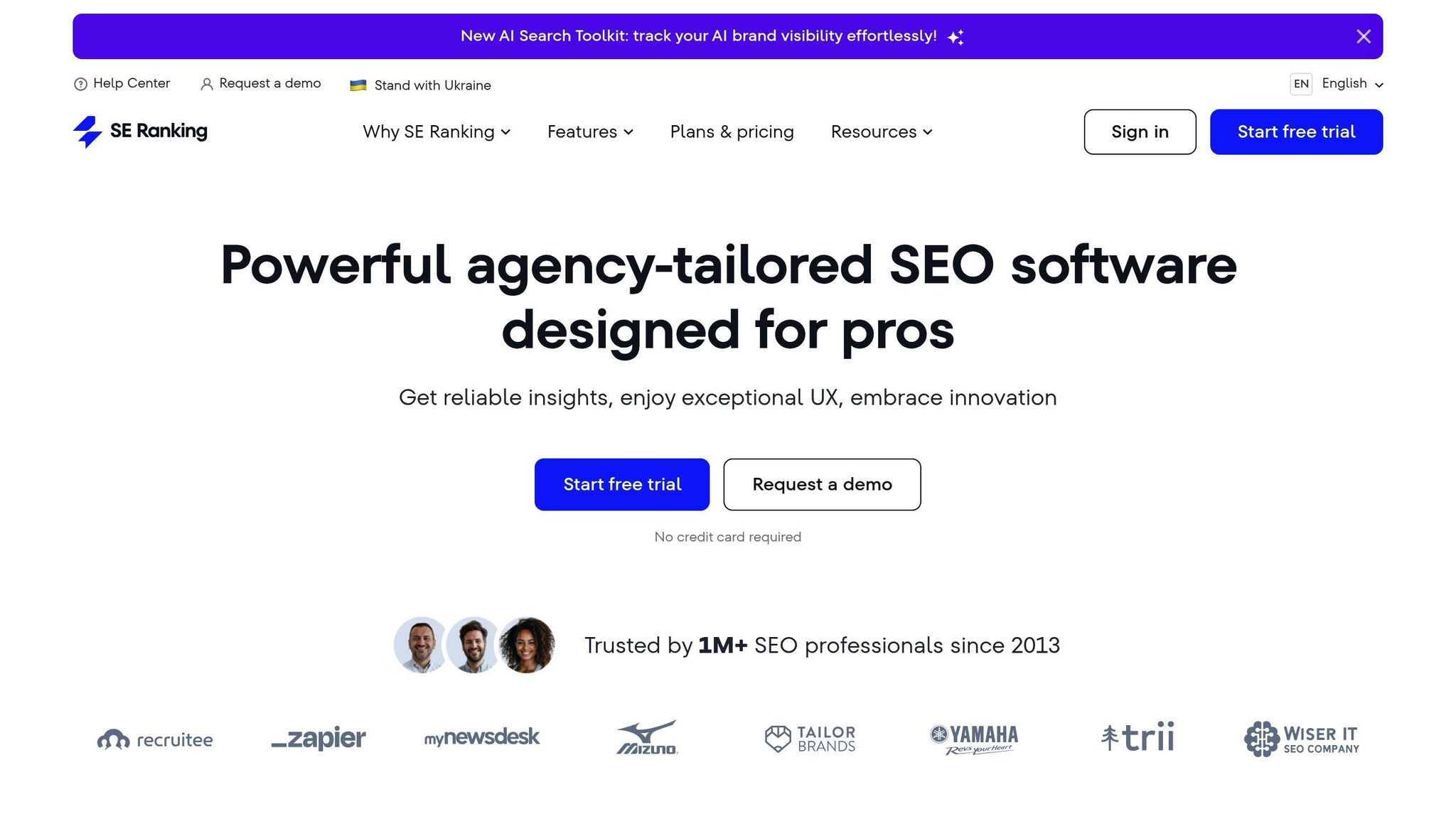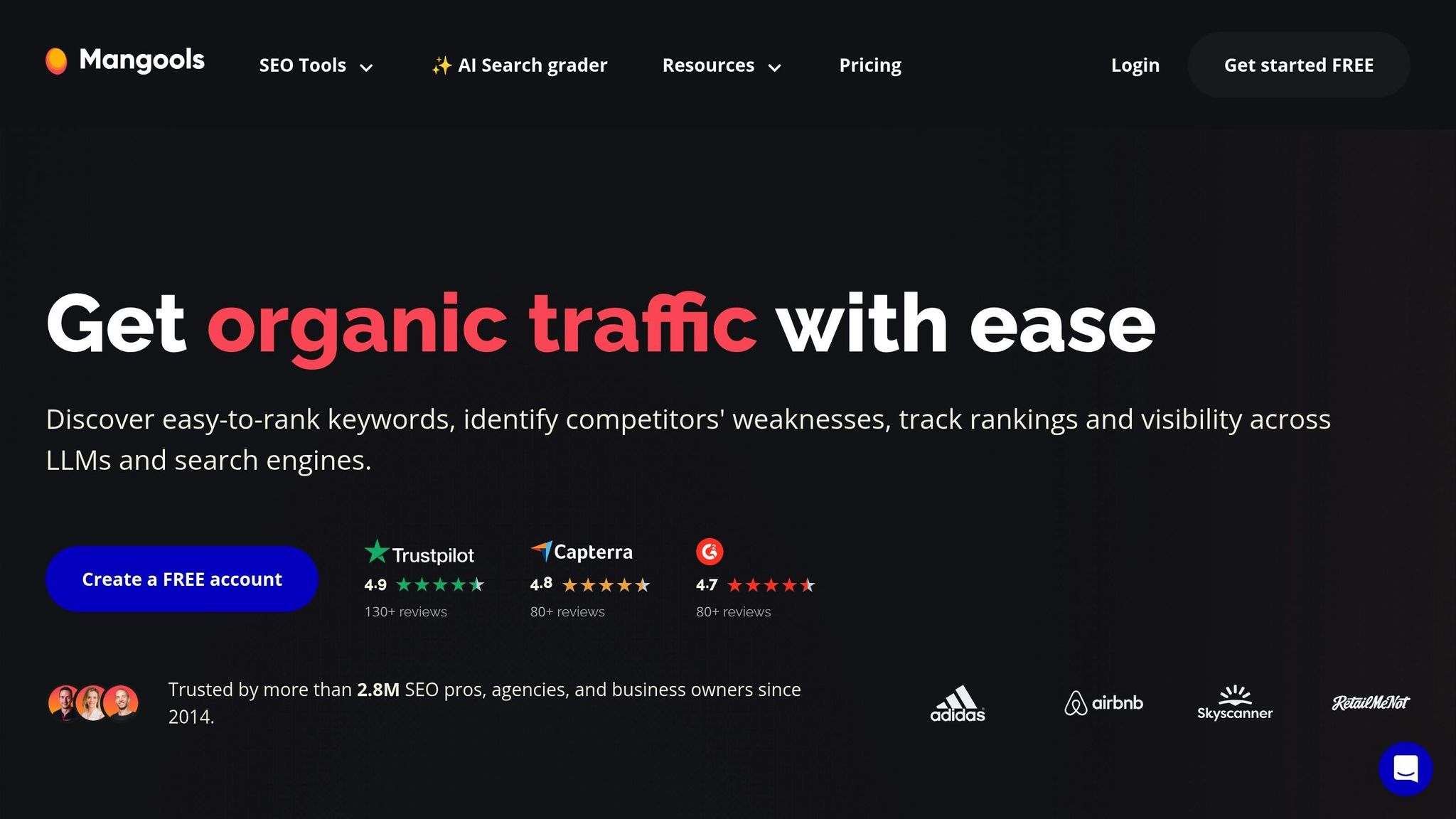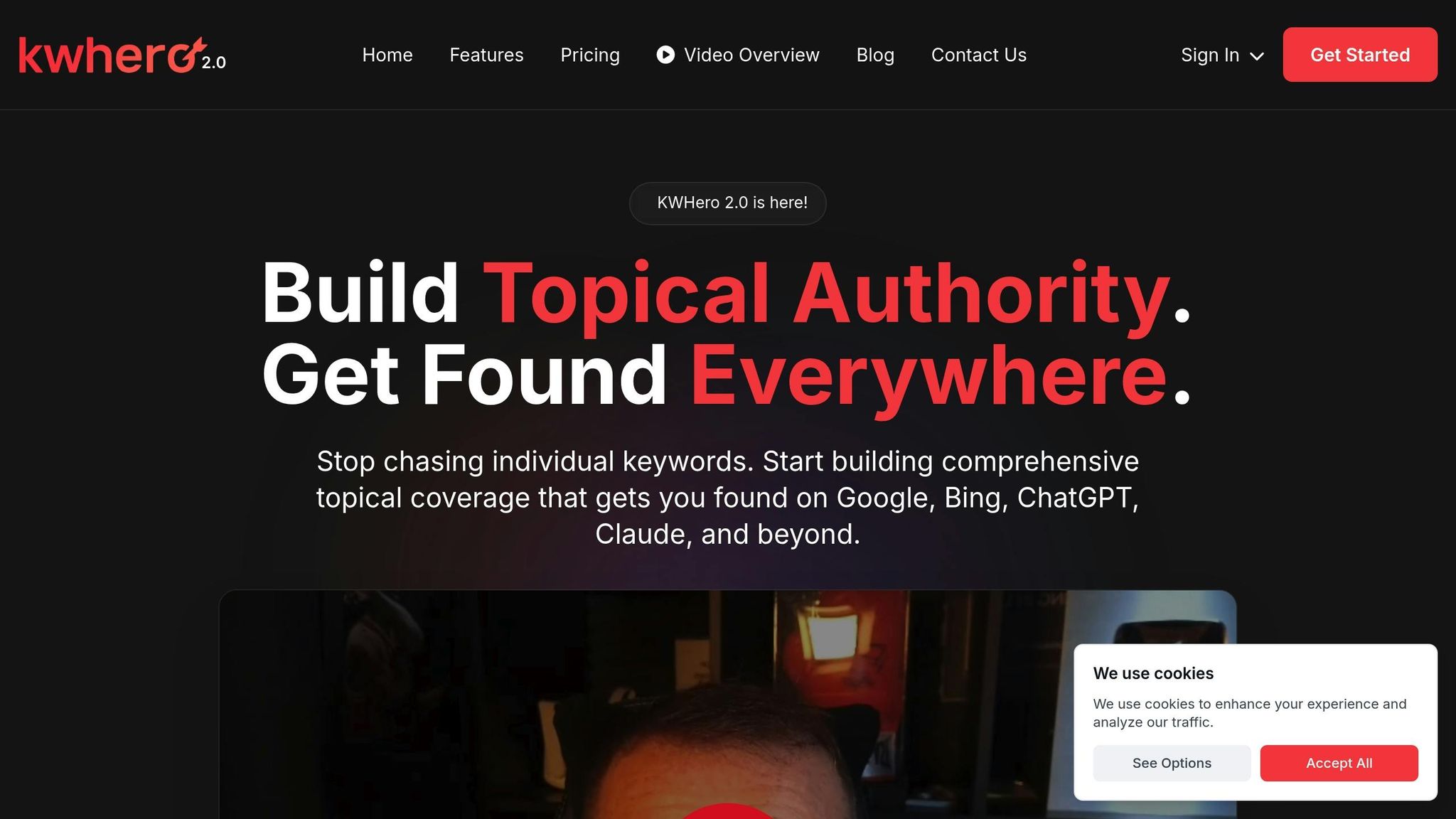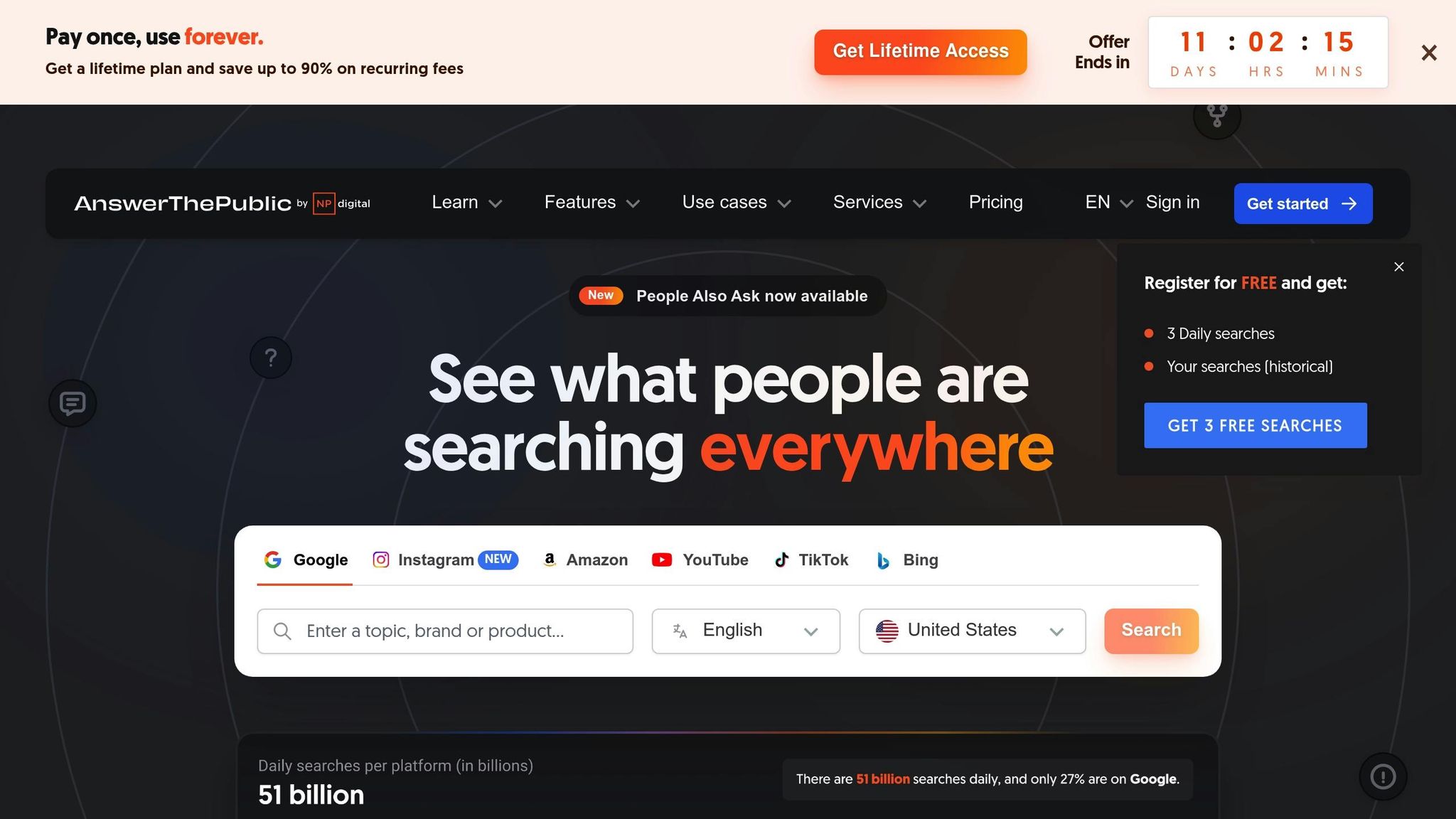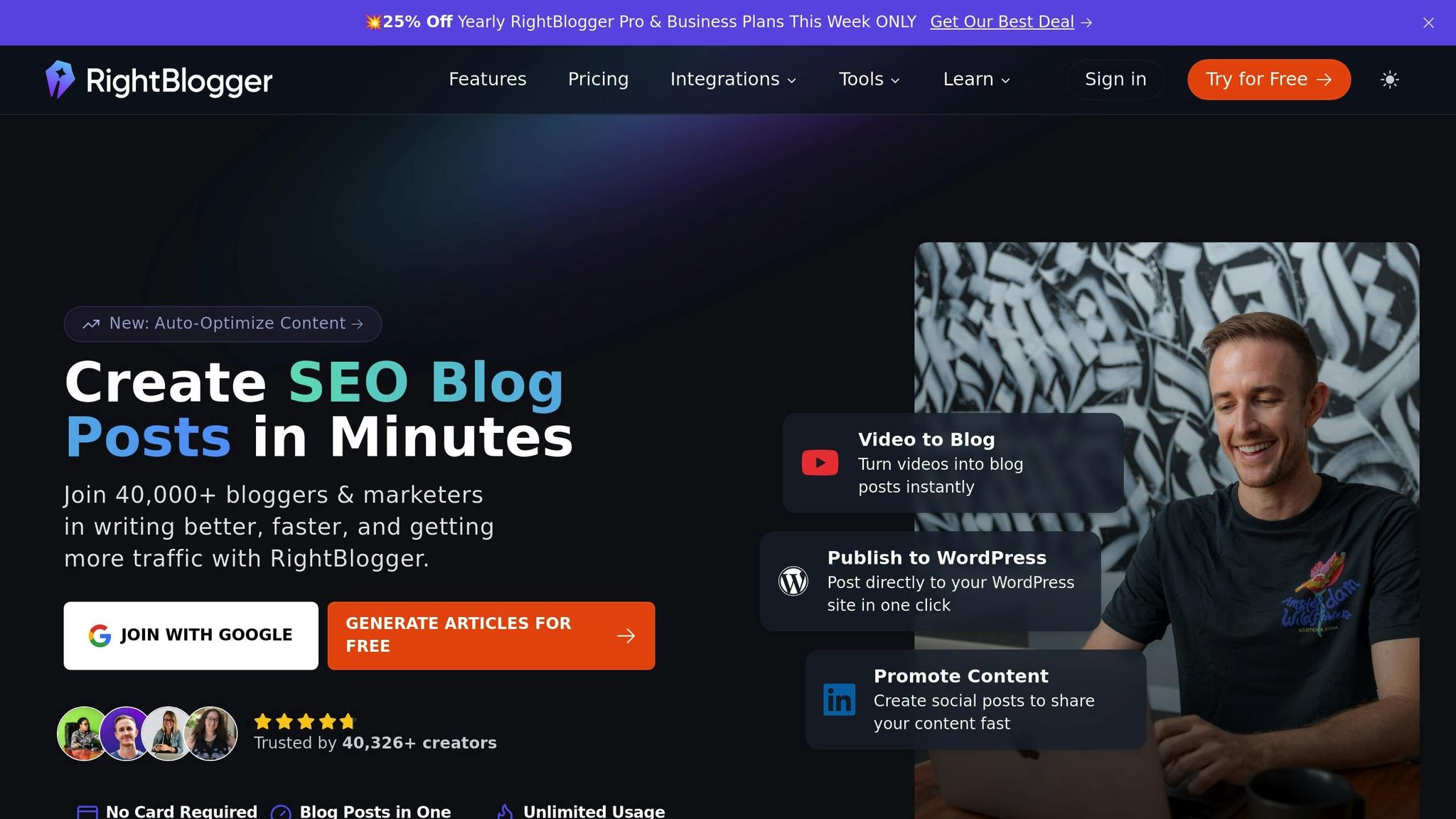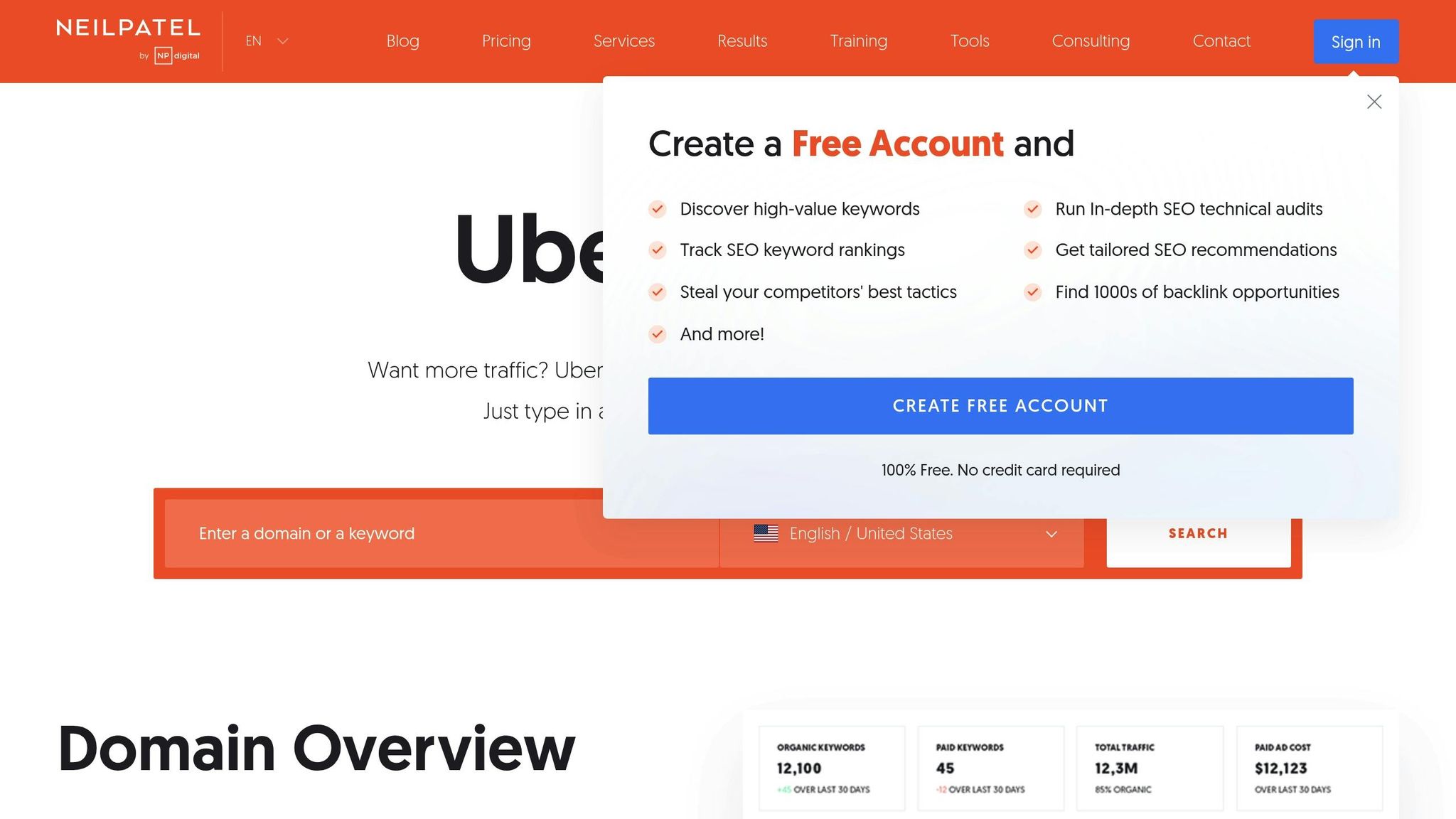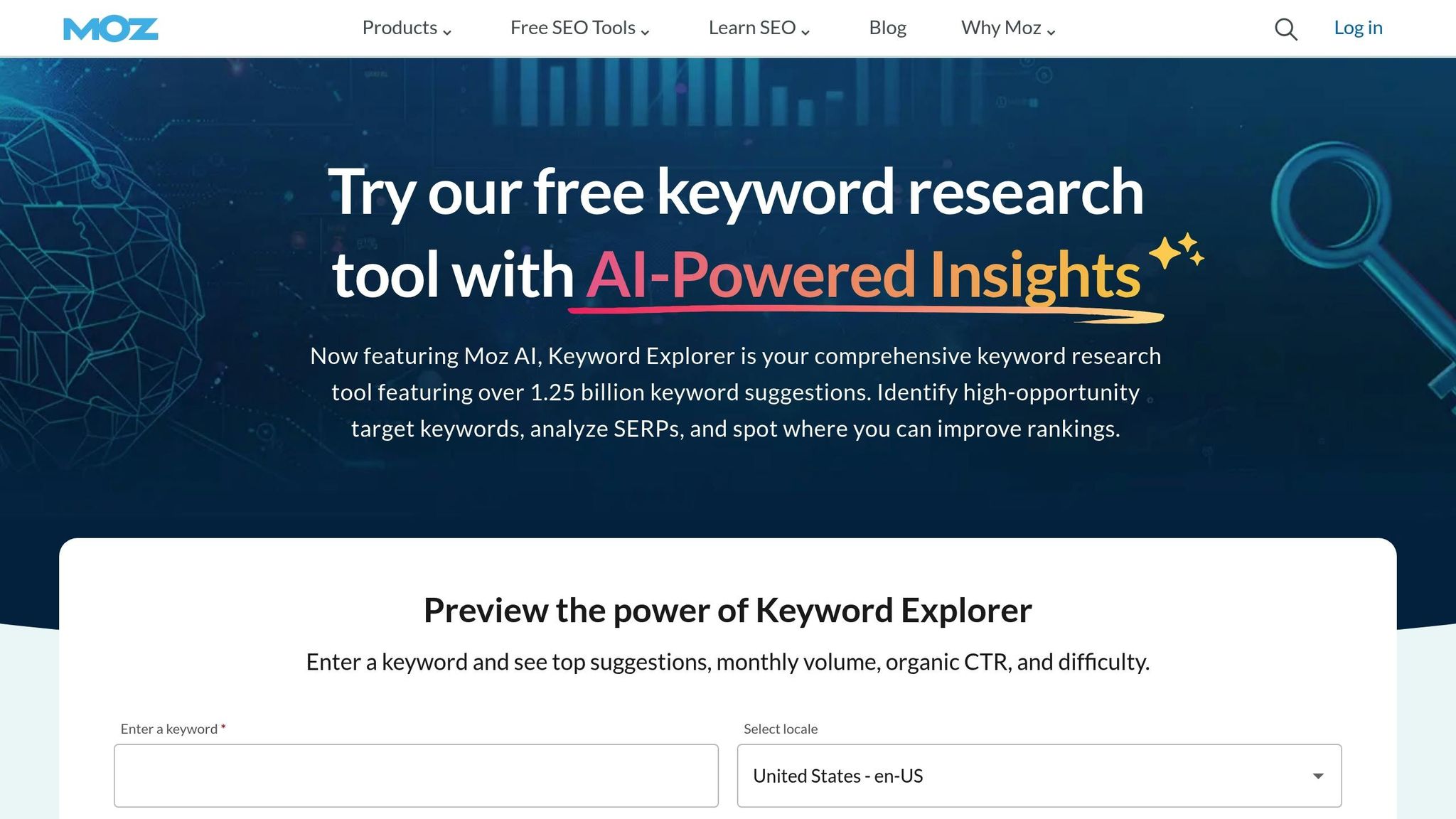In real estate, being visible in local search results is essential. Keyword research tools help you identify the exact terms potential clients are searching for, like "luxury homes in San Diego" or "best realtor in Miami." The challenge is finding keywords that balance search volume with competition, especially in a highly localized industry like real estate. Here’s a quick look at 10 tools that can help real estate professionals improve their SEO:
- Semrush: Advanced competitor analysis and local keyword tracking.
- Ahrefs: Backlink insights and local keyword suggestions.
- Google Keyword Planner: Free tool for basic keyword research and local trends.
- SE Ranking: Affordable option with local and competitor insights.
- Mangools (KWFinder): Simple interface for long-tail keyword discovery.
- KWHero: Geo-specific data and easy integration with real estate platforms.
- AnswerThePublic: Insights into user questions and search intent.
- RightBlogger Keyword Tool: Focused on long-tail keyword opportunities.
- Ubersuggest: Beginner-friendly with location-based keyword data.
- Moz Keyword Explorer: Combines keyword difficulty and local SERP analysis.
Each tool offers unique features for targeting location-specific searches, analyzing competitors, and improving rankings. Whether you’re a solo agent or part of a large brokerage, these tools can help you attract more qualified leads through better SEO.
Quick Comparison
| Tool | Free Option | Key Features | Starting Price |
|---|---|---|---|
| Semrush | Trial | Competitor analysis, local tracking | Subscription-based |
| Ahrefs | Limited | Backlink insights, SERP analysis | Subscription-based |
| Google Keyword Planner | Yes | Local trends, search volume | Free |
| SE Ranking | Trial | Competitor research, local insights | $31/month |
| Mangools (KWFinder) | Trial | Long-tail keywords, simplicity | $29.90/month |
| KWHero | No | Geo-specific data, integrations | Custom Pricing |
| AnswerThePublic | Yes | User questions, search intent | $99/month |
| RightBlogger | Yes | Long-tail focus, affordability | $29.99/month |
| Ubersuggest | Yes | Beginner-friendly, local focus | Subscription-based |
| Moz Keyword Explorer | Limited | Priority score, local SERP analysis | $99/month |
Start with free tools like Google Keyword Planner, then explore paid options as your needs grow. Even a small investment can lead to better rankings and more leads in competitive real estate markets.
Dominate Your Local Real Estate Market: 5 Essential SEO Tools
How to Choose a Keyword Research Tool for Real Estate SEO
Picking the right keyword research tool can either elevate your real estate SEO strategy or hold it back. Here’s a breakdown of the key features to consider when evaluating your options.
Local targeting capabilities should top your list. The tool you choose must allow you to zero in on specific areas like city districts, school zones, or ZIP codes. For example, it should highlight the difference in search volume between phrases like "homes for sale in Brooklyn Heights" and "homes for sale in Park Slope." These distinctions can significantly improve the quality of your leads.
Competitor analysis features are another must-have. These tools can reveal which keywords your local competitors rank for and expose gaps in their strategies. This insight is crucial, especially if you’re targeting competitive markets, such as luxury neighborhoods or well-established areas.
Integration capabilities are key to streamlining your workflow. Some keyword tools integrate seamlessly with MLS systems, CRM platforms, or real estate website builders. This saves you from manual data entry and makes it easier to act on keyword insights. Just make sure the data remains accurate and up-to-date after integration.
Data accuracy and freshness are non-negotiable. Real estate trends can shift rapidly, especially in hot markets. Opt for tools that update keyword data weekly to reflect these changes. Fresh data is critical for tracking seasonal trends and staying ahead of shifting buyer behavior.
Ease of use and quality support shouldn’t be underestimated. The tool should be intuitive, allowing you to generate keyword lists quickly and efficiently. Look for platforms that offer real estate-specific resources like webinars, tutorials, and dedicated customer support, rather than generic advice that might not address your unique challenges.
Budget considerations will naturally play a role in your decision. Keyword research tools vary widely in cost, so choose one that aligns with your budget and delivers a solid return on investment. If a tool helps you close even one extra deal per quarter, it’s worth the cost.
Mobile access is a game-changer for real estate professionals who are constantly on the go. Whether you’re at an open house, between showings, or scouting new neighborhoods, tools with mobile apps or responsive web interfaces allow you to research keywords anytime, anywhere.
Think about your team size and collaboration needs as well. Solo agents might prefer simpler, more affordable tools, while larger teams will benefit from features like shared keyword lists, multi-user access, and collaborative campaign planning.
Lastly, take advantage of trial periods and money-back guarantees. Most reputable tools offer free trials (usually 7-14 days) or 30-day guarantees. Use this time to test the tool with your own market data and evaluate whether it provides actionable insights tailored to your area and property types.
1. Semrush
Semrush gives real estate professionals access to a massive database of over 20 billion keywords. This tool helps agents identify the search terms that matter most for driving traffic and generating leads.
Local Targeting and Geo-Specific Keyword Data
One of Semrush’s standout features is its ability to filter keywords by location. You can refine your research by country, state, or even city, making it an invaluable tool for improving local SEO in the real estate market.
Competitor Analysis Capabilities
Semrush provides powerful tools for analyzing competitors. The Organic Research Competitors report highlights agencies and agents ranking for similar keywords, helping you identify your top rivals in local search. The Keyword Gap tool allows you to compare your site with up to four competitors, uncovering "Missing" or "Untapped" keywords – those high-volume, low-difficulty terms you might be overlooking.
The Market Explorer feature takes it a step further by categorizing competitors into groups like Niche Players, Game Changers, Established Players, and Leaders. This gives you insights into their market share, audience size, and growth trends. Additionally, the Backlink Gap tool identifies domains linking to your competitors but not to you, opening doors for new link-building opportunities.
These features collectively provide a clear roadmap for improving your SEO strategy and staying ahead in a competitive market.
Integration with Real Estate Platforms
Semrush’s Position Tracking tool is another game-changer for real estate professionals. It allows you to monitor your rankings for location-specific keywords and compare your performance against local competitors. Metrics like Visibility, Estimated Traffic, and Share of Voice help you measure your progress and refine your strategy over time.
Budget Considerations (Free vs. Paid Tools)
While Semrush offers a wealth of features, pricing is an important factor to consider. The platform operates on a subscription model without a permanent free tier. However, a free trial is available, allowing you to explore its capabilities before committing to a paid plan.
The base-level plans are ideal for individual agents or small teams, offering limited projects and keyword tracking. For larger brokerages, higher-tier plans include advanced features like historical data and multi-location tracking, making them better suited for scaling operations.
For real estate professionals, the investment in Semrush can pay off significantly. With 99% of homebuyers aged 23 to 56 using the internet during their home-buying journey, and 51% of buyers finding their home online in 2022, even capturing a small fraction of this audience can more than justify the monthly cost – potentially turning a single commission into a high ROI.
2. Ahrefs
Ahrefs is a powerful SEO tool packed with a massive keyword database. Its standout features, like backlink analysis and keyword research, are perfect for identifying lucrative local search opportunities – especially helpful for real estate SEO.
Local Targeting and Geo-Specific Keyword Data
With Ahrefs’ Keywords Explorer, you can filter data by country, state, or even city. It provides essential metrics like search volume, keyword difficulty, and click-through rates. The SERP Overview feature gives you a clear view of top-ranking pages, estimated traffic, and backlink profiles for searches like "homes for sale in [city name]" or "[neighborhood] real estate agent."
Competitor Analysis Capabilities
Ahrefs’ Site Explorer is a goldmine for competitor insights. It shows you their top-performing pages, organic keywords, and traffic estimates. The Content Gap tool helps you identify keywords your competitors rank for that you might be missing. Plus, the Backlink Checker uncovers their linking sources – a critical edge since local SEO often hinges on local citations, partnerships, and industry connections.
Budget Considerations (Free vs. Paid Tools)
Ahrefs operates on a subscription model, with several pricing tiers. While it doesn’t offer a fully free version, its Webmaster Tools account provides limited access for verified sites. For teams serious about local SEO, this investment can deliver the in-depth insights they need.
3. Google Keyword Planner
When it comes to essential tools for local real estate SEO, Google Keyword Planner is a go-to resource for real estate professionals. It offers valuable insights into search behavior on the world’s most popular search engine, giving you a strong foundation for uncovering local trends and opportunities.
Local Targeting and Geo-Specific Keyword Data
One of Google Keyword Planner’s standout features is its ability to focus on specific locations. You can filter search data by country, state, or city, allowing you to pinpoint how people are searching for properties in your target areas. For instance, you might discover popular searches like "condos in downtown Miami" or "family homes near good schools in Austin."
The tool provides monthly search volumes for location-specific keywords, making it easier to spot seasonal trends. For example, you might notice a spike in searches for "vacation rentals" during the summer months, helping you plan your content and campaigns around these patterns.
Budget-Friendly Insights
Google Keyword Planner is completely free for keyword research, although you’ll need to set up a Google Ads account to access it. Importantly, it remains free unless you decide to run paid ads.
Another useful feature is the bid estimates provided for each keyword. These estimates give you a sense of the commercial value of certain search terms. Even if you’re not planning to advertise right away, this data can help you prioritize keywords that are likely to attract serious leads.
For new agents or small brokerages operating on a shoestring budget, this tool is a cost-effective way to gain professional-level insights without the expense of paid tools.
A Glimpse Into Competition
While Google Keyword Planner doesn’t offer detailed competitor analysis, it does include a "Competition" metric for each keyword. This metric – labeled as low, medium, or high – shows how many advertisers are bidding on a specific term.
For real estate professionals, this is a helpful way to gauge market demand. High-competition keywords like "real estate agent" or "homes for sale" might signal saturated markets, whereas less competitive, long-tail keywords could point to untapped opportunities. Although it won’t reveal your competitors’ strategies, it helps you identify areas where you can stand out.
4. SE Ranking
SE Ranking is a powerful tool designed to help real estate professionals with keyword research and competitor analysis. It combines a feature-rich platform with affordability, offering insights that extend beyond basic keyword metrics.
Local Targeting and Geo-Specific Keyword Insights
SE Ranking allows real estate agents to dive deep into local markets by focusing on cities, states, or even ZIP codes. This helps uncover hyperlocal trends and patterns across different areas. With its local keyword tracking, you can monitor performance over time and spot seasonal changes, making it easier to adjust your marketing strategies.
The platform also provides location-specific search volume trends, helping you identify areas with growing demand or neighborhoods that might be losing interest. This gives real estate professionals a chance to target emerging markets before they become oversaturated. Plus, the local data integrates seamlessly with competitor analysis, making it a valuable tool for strategic planning.
Competitor Analysis Features
SE Ranking’s competitor research tools give you a clear view of which real estate websites are ranking for your keywords. It provides insights into competitor rankings, traffic, and backlink sources. The competitor gap analysis pinpoints keywords your competitors are successfully targeting but you may have overlooked – like "pet-friendly apartments downtown", for instance.
On top of that, the backlink analysis feature identifies which local directories, real estate portals, or community sites are linking to your competitors. This information can guide your link-building efforts, helping you connect with the right platforms to boost your visibility.
Flexible Pricing Options
SE Ranking stands out as a budget-conscious choice without compromising on features. It offers a free trial for users to explore the platform before committing to a subscription. Paid plans are tiered, allowing you to scale up keyword tracking and competitor analysis as your needs grow. For real estate teams, premium plans include perks like white-label reporting, which is ideal for creating customized SEO reports for property developers or commercial clients.
5. Mangools (KWFinder/SERPWatcher)
When it comes to real estate SEO, Mangools combines the power of KWFinder for keyword research and SERPWatcher for tracking rankings. This combination makes it a solid choice for real estate professionals who need tools for both finding the right keywords and monitoring their performance.
Local Keyword Research with KWFinder
KWFinder excels at uncovering location-specific keywords that are often overlooked. You can search for terms based on state, city, neighborhood, or even ZIP code. For example, it can help you find long-tail keywords like "waterfront condos Miami Beach" – keywords that have less competition but attract high-intent buyers.
The tool uses a keyword difficulty score ranging from 0 to 100, showing you which terms are realistic to rank for based on your website’s current authority. If you’re just starting out, targeting keywords with a difficulty score under 30 can lead to quicker wins. Plus, it provides 12-month search trend data, allowing you to track seasonal patterns in your market.
One standout feature? KWFinder groups related keywords by location. For instance, if you search for "homes for sale", it suggests variations like "houses for sale", "real estate listings", and "properties for sale" tailored to your target area. This saves you from brainstorming every possible variation and helps you create a well-rounded keyword list.
Competitor Insights with SERPWatcher
SERPWatcher is all about tracking rankings and analyzing competitors. It not only monitors daily ranking changes but also alerts you to significant shifts. Even better, it shows the types of content ranking on page one – whether it’s listing pages, neighborhood guides, or market reports – so you can align your content with what Google is prioritizing.
Another helpful feature is the ability to see your competitors’ estimated traffic value for their rankings. This data reveals which keywords drive the most traffic to their sites, helping you prioritize your own keyword strategy. You can also identify keywords your competitors are ranking for that you might have missed, giving you an edge in your local SEO efforts.
Pricing and Trial Options
Mangools offers a 10-day free trial, which includes 100 keyword lookups and 200 SERP lookups per day. This trial period gives you plenty of room to explore keywords and rankings for multiple listings or areas before deciding on a paid plan.
The Basic plan, priced at $19.90 per month (when billed annually), is an affordable option for individual agents or small teams. It includes 100 keyword lookups per day and tracks up to 200 keywords – enough for most real estate professionals.
For larger brokerages, the Premium plan at $44.90 per month expands the limits to 500 daily keyword lookups and 700 tracked keywords. It also includes white-label reporting, which allows you to create branded reports for clients or developers without the Mangools logo – a great feature for those working with external stakeholders.
6. KWHero
KWHero helps real estate professionals establish expertise by focusing on targeted keyword research and content insights. This approach allows you to build authority in areas like specific property types, neighborhoods, and market segments by zeroing in on the most relevant keywords.
Local Targeting and Geo-Specific Keyword Data
KWHero offers keyword insights across hundreds of topics in 62 countries. This means you can analyze local trends with precision. For example, if you search for terms like "luxury condos downtown Seattle" or "family homes near good schools Austin," the platform suggests related keywords to help you understand what potential buyers are looking for. Beyond keyword suggestions, KWHero tracks domain authority, topical relevance, link strength, and LLM signals across all supported regions. These detailed local insights integrate seamlessly into your content strategy, boosting your SEO efforts.
Integration with Real Estate Platforms
KWHero simplifies content management with tools designed for real estate professionals. It offers a WordPress plugin and API access, making it easy to publish content directly or integrate the platform with your existing tech stack. This is especially helpful for real estate websites built on WordPress, streamlining your workflow and saving you time.
sbb-itb-82c5f45
7. AnswerThePublic
AnswerThePublic helps you uncover what potential clients are searching for. This keyword research tool collects user queries in the form of questions, prepositions, and comparisons, giving you a peek into the real conversations people are having about real estate.
The tool pulls autocomplete data and organizes it into visual maps. For example, a search for "home buying" might reveal questions like "how does the home buying process work", "when is the best time to buy a home", or "why is home buying stressful." These insights can guide you in creating content that directly addresses the concerns and interests of your audience.
Local Targeting and Geo-Specific Keyword Data
One of the standout features of AnswerThePublic is its ability to filter search data by country and language. By focusing on U.S.-specific queries, you can uncover regional differences in how people search for real estate information. For instance, location-based questions like "where to buy investment property" or "which neighborhoods have the best schools" can help you tailor content to resonate with local audiences. This geo-targeted approach ensures your content feels relevant and actionable for specific markets.
Budget Considerations (Free vs. Paid Tools)
AnswerThePublic offers a free plan that allows up to two searches per day – perfect for occasional or niche research. For those needing more robust capabilities, the paid plans start at $99 per month. These plans provide unlimited searches, data exports, and additional features like keyword trend tracking. Real estate teams or agencies working across multiple markets will appreciate the ability to export data as CSV files, making it easier to integrate findings into content planning workflows.
8. RightBlogger Keyword Research Tool
The RightBlogger Keyword Research Tool provides precise search volumes and difficulty ratings, giving you the numbers you need to make smarter decisions about which keywords to target for your real estate content. It’s especially effective at identifying long-tail keywords that potential clients are searching for, such as "luxury homes for sale near me" or "first-time homebuyer programs." This detailed data can help you fine-tune your local SEO strategy for better results.
Local Targeting and Geo-Specific Keyword Data
With its "Select Your Target Country" feature, RightBlogger makes it easy to focus on U.S.-specific keywords. This geo-targeting option ensures your content aligns with how American homebuyers and sellers search online, making your strategy more relevant to the local market.
While the tool prioritizes country-level targeting rather than city-specific data, it’s still a great way to identify national trends and popular real estate terms that resonate across various U.S. regions. This broader approach can help you craft content that appeals to a wider audience while staying relevant to regional preferences.
Competitor Analysis Capabilities
RightBlogger also offers tools to help you understand what’s working for your competitors. The Content Gap Tool highlights areas where competing real estate websites are outperforming you, uncovering keyword opportunities you might have overlooked. Meanwhile, the Backlink Checker lets you dive into the link profiles of top-performing real estate sites, offering insights into their SEO strategies and giving you ideas for your own approach.
Budget Considerations (Free vs. Paid Tools)
RightBlogger understands the importance of affordability. Their free version provides up to 25 keyword results per search, and there’s no need to enter credit card information. This makes it an excellent option for real estate professionals just starting out with keyword research.
For those looking for more features, the Pro plan costs $29.99 per month, or you can save by opting for annual billing at $24.99 per month. The Business plan is priced at $59.99 per month, with an annual billing option that brings the cost down to $37.49 per month. Both paid plans include a 30-day money-back guarantee, and there’s currently a 25% discount on yearly subscriptions. These options provide flexibility and scalability for growing your content marketing efforts.
9. Ubersuggest
Ubersuggest is a straightforward keyword tool designed to make SEO easier for real estate professionals. Its simple interface provides detailed data on search volume, competition, and cost-per-click, making it accessible even for those new to SEO.
One of its standout features is the ability to generate content ideas directly from real search queries. For instance, starting with a term like "homes for sale" could lead you to discover more specific phrases like "homes for sale with swimming pools" or "affordable homes for sale." These long-tail keywords give you a clearer picture of what potential clients are actually searching for, paving the way for effective localized strategies.
Local Targeting and Geo-Specific Keyword Data
Ubersuggest also shines when it comes to location-based keyword research. You can narrow down results by specific markets, uncovering regional search trends and seasonal patterns. Its "Keyword Ideas" feature organizes suggestions into categories, such as related terms and frequently asked questions. This makes it easier to pinpoint opportunities that align with local interests, like searches for well-known neighborhoods or properties near local landmarks.
Competitor Analysis Tools
The platform’s Site Audit and Top Pages reports give you a peek into your competitors’ strategies. You can identify the keywords they rank for, assess their content performance, and even spot backlink opportunities – all of which can help fine-tune your approach.
Cost-Effective Options
For those just starting out, Ubersuggest offers a free tier that lets you explore its basic features without any upfront cost. If you need more advanced tools or higher usage limits, there are subscription plans available at reasonable prices, making it a budget-friendly choice for thorough keyword research and SEO planning.
10. Moz Keyword Explorer
Moz Keyword Explorer provides a detailed look into search behavior and competitive landscapes, making it a go-to tool for keyword research. One standout feature is the Priority Score, which combines search volume, organic click-through rates, and keyword difficulty into a single metric. This makes it easier to focus on the keywords that matter most.
The tool also excels at uncovering long-tail keywords. For example, a search for "real estate agent" might reveal phrases like "experienced real estate agent near me" or "top-rated real estate agent reviews." These more specific terms tend to have lower competition but attract users who are closer to making a decision – ideal for targeting motivated prospects.
Local Targeting and Geo-Specific Keyword Data
Moz’s location-based filtering is a game-changer for local SEO. You can set geographic parameters to see how keyword difficulty and search volume shift across different areas. For instance, the keyword "luxury condos" might be highly competitive in Manhattan but face less competition in growing markets like Austin or Nashville.
The SERP Analysis feature offers a clear breakdown of ranking factors for specific keywords in specific locations. It can show whether you’re up against national real estate platforms, local brokerages, or individual agent websites. Plus, it highlights opportunities like featured snippets – perfect for queries such as "how to buy a house in [city name]."
These insights make it easier to tailor your strategy to local markets.
Competitor Analysis Capabilities
Moz also shines in competitor research. By entering a competitor’s domain, you can uncover their top-ranking keywords, estimated organic traffic, and content gaps. This allows you to reverse-engineer their strategies and identify opportunities to outperform them, especially for neighborhood-specific terms.
Another useful feature is Moz’s ability to track keyword ranking changes over time, helping you spot seasonal trends. For example, searches for "homes with pools" might peak during spring, giving you the chance to align your content and campaigns with these trends.
Budget Considerations (Free vs. Paid Tools)
Moz offers options for different budgets, making it accessible to a wide range of users. The free tier allows up to 10 keyword queries per month and includes basic SERP analysis. This is a good starting point for agents new to SEO or those focusing on a limited number of keywords.
For more advanced needs, the paid plans start at $99 per month with the Standard plan. This includes 5,000 keyword queries, rank tracking for 300 keywords, and access to tools like the MozBar browser extension. For larger real estate teams or brokerages managing multiple markets, the Medium plan at $179 per month provides 15,000 queries and tracking for 1,500 keywords – perfect for a deeper dive into market analysis.
Tool Comparison Table
Here’s a quick look at the entry-level pricing for some popular keyword tools. This comparison can help you decide which option aligns with your needs and budget.
| Tool | Starting Price |
|---|---|
| Semrush | – |
| Ahrefs | – |
| Google Keyword Planner | Free |
| SE Ranking | $31/month |
| Mangools (KWFinder/SERPWatcher) | $29.90/month (annual billing) |
| KWHero | – |
| AnswerThePublic | – |
| RightBlogger Keyword Research Tool | – |
| Ubersuggest | – |
| Moz Keyword Explorer | – |
If you’re just starting out or working with a tight budget, Google Keyword Planner is a standout choice – it’s completely free. For those looking for affordable yet powerful tools, Mangools (starting at $29.90/month with annual billing) and SE Ranking ($31/month) are excellent options. Both offer features that are particularly valuable for real estate professionals.
Most tools in this category fall within the $30–$100 range, providing a variety of choices based on your SEO needs. Whether you’re new to SEO or looking for advanced capabilities, there’s an option for everyone. Use this table as a handy reference to match your budget with the right keyword research tool.
Conclusion
Picking the right keyword tool can make a big difference in your real estate SEO efforts. With 53% of website traffic coming from organic search, it’s crucial to choose a tool that aligns with your goals, budget, and overall strategy to stay ahead of the competition.
For those keeping an eye on costs, starting with free tools like Google Keyword Planner is a smart move. As your needs grow, you can explore paid options with advanced features. Tools like Mangools and SE Ranking are especially helpful for local SEO, enabling you to find long-tail keywords such as "homes for sale in [specific neighborhood]" that attract serious buyers.
Using these insights, you can refine your strategy and focus on creating content that drives results. For instance, updating your blog regularly can lead to a 55% increase in website traffic, and publishing one or two posts a month can significantly boost your organic presence.
Many top-performing real estate professionals rely on a combination of tools to cover all aspects of SEO. Start with what fits your budget now, and expand your toolkit as your business and SEO needs grow.
The key is to take that first step. Whether you begin with Google Keyword Planner or invest in a comprehensive platform like Semrush, starting your keyword research today sets the foundation for long-term SEO success.
FAQs
What’s the best way to choose a keyword tool for real estate SEO?
Choosing the Best Keyword Tool for Real Estate SEO
Finding the right keyword tool for your real estate SEO strategy comes down to your specific goals and budget. If you’re looking for a free option, Google Keyword Planner is an excellent starting point. It’s especially useful for discovering hyperlocal keywords and long-tail phrases tailored to specific U.S. markets.
For those who need more advanced insights, paid tools like Ahrefs, SEMrush, or Moz offer features that go beyond the basics. These platforms can help you analyze keyword trends, monitor competitors, and fine-tune your local SEO efforts, giving you a competitive edge.
No matter which tool you choose, prioritize ones that deliver accurate and up-to-date data while keeping an eye on local search trends. This ensures your keywords match what potential buyers and sellers are actively searching for, ultimately helping you drive more leads and climb the rankings.
What’s the difference between free and paid keyword research tools for real estate SEO?
Free vs. Paid Keyword Research Tools for Real Estate SEO
When it comes to keyword research for real estate SEO, the choice between free and paid tools boils down to the depth of data and features they provide.
Free tools, like Google Keyword Planner, are great for beginners or those working with limited resources. These tools offer basic keyword suggestions and a general idea of search volumes, making them a solid starting point if you’re just dipping your toes into SEO.
On the other hand, paid tools like SEMrush or Ahrefs take things to the next level. They deliver detailed keyword metrics, competitive analysis, historical data, and even tracking features. These tools are perfect for professionals who want to craft advanced strategies and stay ahead in the competitive real estate market. If you’re running a serious campaign, the precision and extra insights from paid tools can play a crucial role in boosting your rankings and bringing in more leads.
How can keyword research tools help me stand out in my local real estate market?
Keyword research tools play a crucial role for real estate professionals aiming to stand out in their local market. These tools help uncover targeted local search terms, allowing agents to focus on specific neighborhoods, buyer interests, and seller needs. This precision not only improves search engine rankings but also ensures your content connects with the right audience.
Armed with detailed keyword insights, you can craft content that draws in qualified leads, increases website traffic, and gives you an edge over competitors. Using these tools effectively positions you as a go-to expert in your local real estate scene.



